Most discussions of indoor air quality center on the workplace. There is, however, perhaps an even more important location where air quality can have a huge effect on your health and quality of life: the home.
If your home has poor air quality, it could be wreaking havoc on your respiratory system and could be laying the foundation for much more serious issues down the line. The average person spends the majority of their day indoors. When you are not at work, you are probably relaxing at home.
What might be harming your home’s air quality? Allergens, in the form of dust and pollen are very common in the average residential neighborhood, especially during the summer. If you open your windows, you might be creating a nice breeze in your home, but you will also be letting dust and pollen into that home, which can irritate anyone who has allergies or other respiratory problems. Chemical and paint fumes can build up in enclosed spaces and start to become dangerous. If you have never given a thought to how healthy your home’s air is, now is the time to start.
Here Are Five Reasons You Should Be Breathing Healthier Air At Home
1. Prevent illnesses
Poor indoor air quality in your home can lead to a wide variety of problems. While an allergic reaction is the most common result, consistent exposure to a pollutant can result in illnesses, too. At first, the people in that household will start to notice that their eyes, throat, and nose are irritated. They might start to have a headache or feel dizzy and fatigued throughout the day. Often, these symptoms will disappear when they are no longer in the house, but over time, continued exposure to these indoor pollutants can start to exacerbate existing or dormant conditions like asthma.
Most people who breathe unhealthy air will have a suppressed immune system, which means that come cold and flu season, they are much more likely to come down with an illness. Carbon monoxide can be dangerous to everyone in a household, but it is especially dangerous to those with heart conditions. Healthier air can prevent illness or the worsening of illness in the home.
2. Limits exposure to mold
Mold, to some degree, is all around us. It becomes a problem in home because it can be significantly more concentrated in indoor spaces than it is outdoors. Why is this a problem? Mold, especially black mold, has been linked to a number of respiratory illnesses. Even if you do not have a mold problem on the surfaces of your home, you might still have a high enough concentration of mold spores in the air of your home that the people in that home might begin to suffer. Healthier air will get mold levels back under control.
3. 72% of your chemical exposure is at home
The average person spends 90% of their day indoors. While a lot of this time might be spent indoors at school or at work, the majority of chemical exposure happens at home. And even though most working people spend the majority of their time asleep while at home, they are, of course, still susceptible to pollutants in the air. This means that you should be even more concerned about the health of your home’s air than you are about the health of the air in schools or workplaces.
4. Children are more susceptible to poor indoor air quality than adults
Your children likely spend more time at home than the adults in the home do, as most schools have shorter hours than most offices do. Developing children are effected by environmental pollutants more than teenagers and adults, because they breathe, drink, and eat proportionately more (by weight) than those with fully developed bodies do. They are therefore more effected by what they breathe, drink, and eat. It is especially important for this segment of the population to be breathing healthy air in the home.
5. Have a more comfortable home
While health concerns are obviously the most important reason to breathe healthier air, simply having a more comfortable home environment is almost as important. When you step into your home and you feel like you can breathe deeply of clean air, you will be more relaxed. Healthy air makes your home a more comfortable place to be and it can actually impact your mood and your brain’s performance. When your air is unhealthy, you will like experience fatigue and brain fog. When it is clean, you will be perfectly clear and energized, which will ensure that your home is a pleasant place to be.
Chemicals, both those that are used to clean the home and those that are used to make the products you use at home every day, contribute to poor indoor air quality, as does mold, particulates, and poor ventilation.
While trying to eliminate the sources of the pollutants is a good option, adding an effective air purification system to your home is almost always the very best option. Adding a UV light to an HVAC system, for example, can help to kill mold and other bacteria in the air, making it a necessity for healthy air.
 SEE OUR SPECIALS
SEE OUR SPECIALS SCHEDULE SERVICE
SCHEDULE SERVICE





 Call 703-884-2376
Call 703-884-2376


